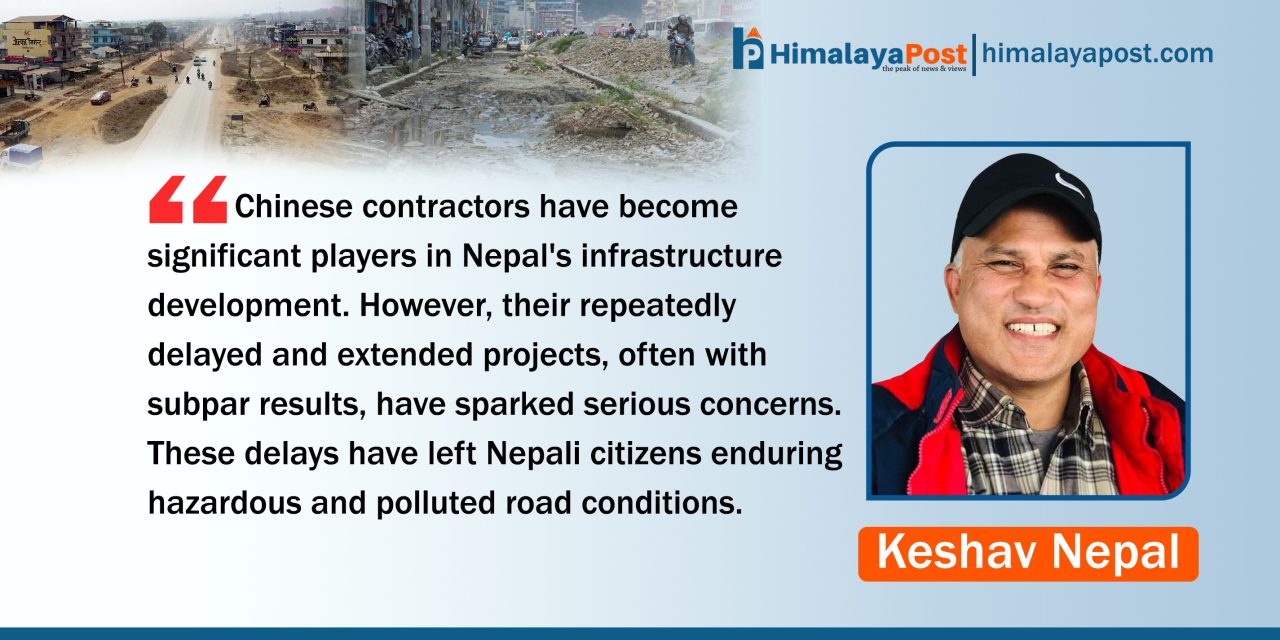-Keshav Nepal
Delays in the construction of key road projects in Nepal, such as the Kathmandu Ring Road and the Butwal-Narayanghat segment of the East-West Highway, have underscored inefficiencies and challenges in projects undertaken by Chinese contractors. These setbacks not only disrupt daily life but also hinder Nepal’s broader economic and infrastructural progress.
Chinese contractors have become significant players in Nepal’s infrastructure development. However, their repeatedly delayed and extended projects, often delivered with subpar results, have sparked serious concerns. These delays have left Nepali citizens enduring hazardous and polluted road conditions, particularly in the heart of Kathmandu and along the critical Narayanghat-Butwal segment of the Mahendra Highway, a lifeline of Nepal’s economy.
Such inefficiencies have raised questions about the credibility of projects linked to China’s Belt and Road Initiative (BRI). The challenges include sluggish project execution, doubts about financial viability, poor contractor performance, and unresolved environmental and social issues. Additionally, Nepal’s preference for grants over loans has strained relations with Chinese financiers.
To address these issues, Nepal must prioritize better project planning, enforce contracts more rigorously, engage stakeholders effectively, and diversify its pool of contractors. Empowering and trusting capable Nepali contractors, who have proven their efficiency and skill, could also play a crucial role in ensuring successful infrastructure development.
Kathmandu Ring Road Expansion
A grant from China is being used to finance the second phase of the Kathmandu Ring Road expansion, which covers 8.2 km from Kalanki to Basundhara. The project is still stalled despite its importance in reducing traffic congestion. While the first phase (Koteshwar to Kalanki) was completed between 2012 and 2018, the second phase has seen no significant progress even after a 2024 agreement. Delays in project documentation and the unavailability of construction materials have further compounded the issues. Experts believe that the slow progress is due to insufficient Chinese grant funding
Butwal-Narayanghat Highway Delays
The Butwal-Narayanghat section of the East-West Highway is another delayed project. The road-widening work, overseen by China State Construction Engineering Corporation Limited, began in 2019 with a NPR 17 billion budget under Asian Development Bank financing. The project was originally planned to be completed by 2022, but it has only reached 52% completion as of November 2024.
Key factors delaying the project include the COVID-19 pandemic, delayed tree clearance, and the contractor’s inadequate manpower and resources. Road conditions have worsened, with potholes and rough patches posing significant risks to travelers. Commuting time between Butwal and Narayanghat has drastically increased, from the usual 2.5 hours to over 5 hours. The Department of Roads has issued warnings and may terminate contracts if public dissatisfaction does not improve as a result of the surge in public dissatisfaction
Broader Implications
These delays are not isolated issues but reflect systemic inefficiencies in Nepal’s infrastructure projects involving Chinese contractors. The slow pace affects economic activities, disrupts transportation, and damages Nepal’s aspirations for regional integration. Projects of such scale are pivotal to enhancing the country’s connectivity and attracting foreign investment, but inefficiencies undermine these goals.
Challenges with Chinese Contractors
The performance of Chinese contractors in Nepal has also raised concerns about their ability to deliver quality infrastructure under Nepal’s specific conditions. Their involvement, often linked to China’s Belt and Road Initiative (BRI), has come under scrutiny for delays and subpar management, which challenge the initiative’s promise of fostering global development.
Path Forward
Nepal must address these challenges by improving project management and enforcement mechanisms. Specific recommendations include:
- Strengthening Oversight: The government should rigorously monitor ongoing projects and enforce stricter timelines.
- Enhancing Transparency: Clear communication about project milestones and challenges can help maintain accountability.
- Capacity Building: Training local teams in project management could reduce reliance on external contractors.
- Reevaluating Partnerships: Diversifying contractors beyond Chinese firms might mitigate risks.
Nepal can ensure that future infrastructure projects progress efficiently by taking these steps, which will provide tangible benefits to its citizens and strengthen national development efforts.





